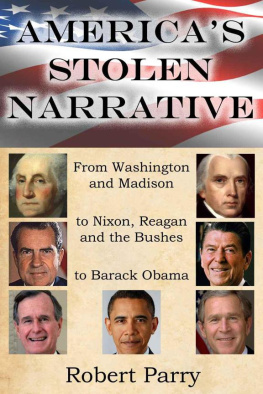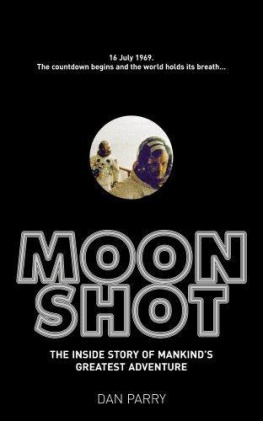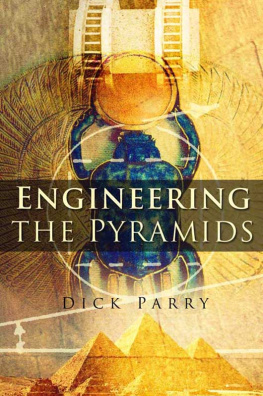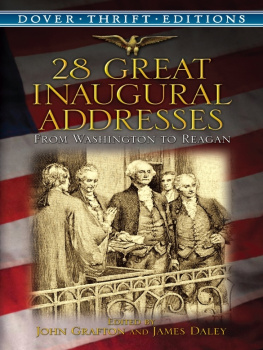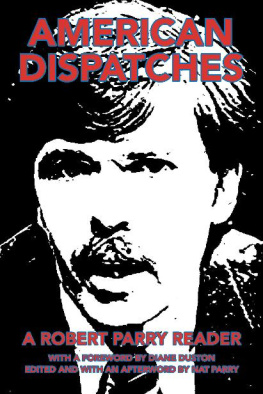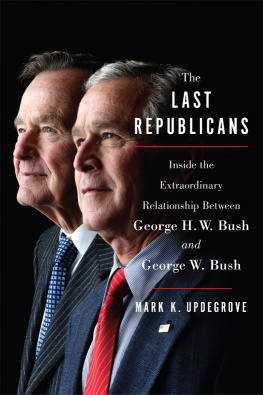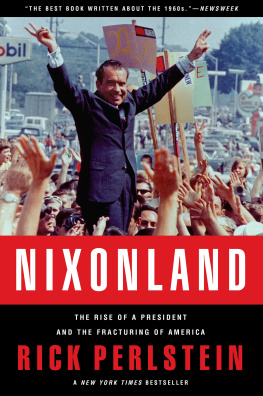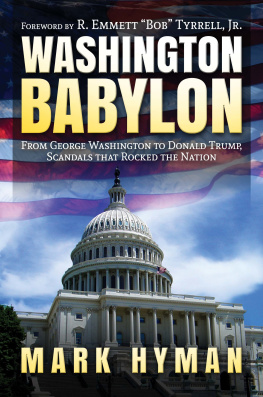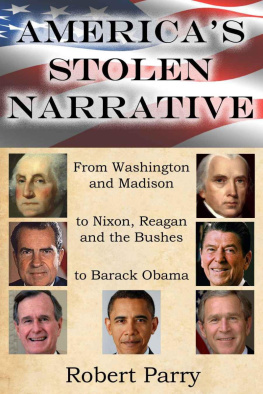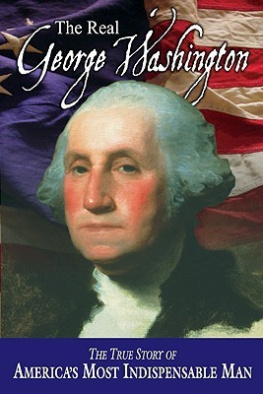Americas Stolen Narrative
From Washington and Madison to Nixon , Reagan and the Bushes to Obama
Robert Parry
The Media Consortium
Arlington , Virginia
To Josie , Drew , Abby and Eva
Copyright 2012 by Robert Parry
All rights reserved under International and Pan-American Copyright Conventions. Published in the United States by
The Media Consortium, Arlington, Virginia
Grateful acknowledgement to Sam Parry for his assistance in preparing this book. And to Jean and Dean Duston for their support.
Parry, Robert, 1949-
Americas Stolen Narrative: From Washington and Madison to Nixon , Reagan and the Bushes to Obama
Included index
ISBN 978-1-893517-05-9 (paperback)
Printed in the United States of America
C O N T E N T S
Introduction
Chapter 1: What the Framers Wanted
Chapter 2: Nixon s Treason
Chapter 3: The Road Not Taken
Chapter 4: On to Watergate
Chapter 5: The October Surprise
Chapter 6: Caving In
Chapter 7: CIA Within the CIA
Chapter 8: The Cover-up Succeeds
Chapter 9: After the Debunking
Chapter 10: Trust Colin Powell ?
Chapter 11: The Wise Man from Wichita
Conclusion
Index
Notes
Wh o controls the past controls the future; who controls the present controls the past.
Party slogan in George Orwells 1984
Introduction
There was always something surreal about George W. Bush s presidency, like a science-fiction disaster movie in which an alien force seizes illegitimate control of a nation, saps its wealth, wreaks devastation on its people, but is finally dislodged and forced to depart amid human hope for a rebirth. In Bushs case, there was even a satisfying concluding scene as a new human leader takes power amid cheers of a liberated populace. The alien flees aboard a form of air transportation (in this case, a helicopter), departing to the jeers of thousands and many wishes of good riddance.
But then the depleted country must turn to rebuilding and recovery. Many of the humans find their jobs are gone, or their stock portfolios, or their homes. They grow disillusioned and impatient. It turns out that many of the aliens allies remain in positions of power, a stay-behind force, especially within the nations propaganda structure as well as at high levels of the government, courts and business. These operatives quickly get to work erasing memories of how the catastrophe occurred. They write a new narrative that shifts the blame to the new leader.
Facts are selectively presented to convince millions of the people that they should welcome another alien to rule them. Indeed, much of the population begins to accept a story line that places the alien conquest within the context of the nations origins. Its all what the Founders intended. What the aliens understand since they have studied this population for many years is that they can direct the people by shaping the historical narrative. If the narrative can be shifted or falsified, the course of the nation can be redirected. By tinkering with the past or blacking out some key facts, the aliens can make their behavior appear normal, even admirable.
In this sci-fi metaphor, the only way for the humans to escape slavery is to rediscover and reclaim their truthful narrative, to identify and eliminate the false story lines that the aliens have inserted into the history. A truthful narrative is their only route to freedom.
***
On a bitterly cold day January 20, 2009 my youngest son, Jeff, then 20 years old, and I joined the masses of humanity that struggled against an overwhelmed mass transit system to get anywhere close to the U.S. Capitol where Barack Obama was to be sworn in as the 44 th President of the United States, the first African-American to hold that office.
We parked my green Chevy Prism in Pentagon City, an area of shops and restaurants near the Pentagon in Arlington, Virginia, and pushed our way into the Metro station and onto a train that took us across the Potomac River to Washington. There, we found ourselves exiting the train into even a larger throng of people. We inched and elbowed our way to an escalator and ascended to the bright frigid weather that had settled over the U.S. capital.
Bending against the bitter cold, we maneuvered toward the Mall, confronting barriers that required special credentials to pass through. Not having those credentials, we kept bending left away from the Capitol building and its famous white dome. Finally, we found a spot on the Mall almost to 14 th Street. We picked out a small opening and stood shivering among the other 1.8 million people who filled the blocks upon blocks west from the Capitol, which looked rather tiny from our perspective about a mile away. Our view of the Inauguration came mostly via the Jumbotrons that were spaced along the edges of the Mall.
Despite the freezing temperatures and the transportation woes not to mention the devastated economy and the two unfinished wars that George W. Bush was leaving behind the crowd was remarkably friendly and upbeat. Inauguration Day 2009 was filled with a joy that I have rarely seen on the streets of Washington, a city that even at its best is not known for spontaneous bursts of happiness.
But there was more than joy that day; there was a sense of liberation. People were not only witnessing Obama s swearing-in, but Bushs ushering-out. They not only cheered Obama and their other favorites, but many booed those considered responsible for the national plundering, especially Bush and his wheelchair-bound Vice President Dick Cheney .
When Bush arrived or when Cheney was wheeled into view, people shouted in anger or heckled. Bush was serenaded with the mocking lyrics, Na-na-nah-na, na-na-nah-na, hey, hey, hey, goodbye. One group near us started singing, Hit the road, Jack.
Some Georgetown students next to Jeff tut-tutted the failure of the crowd to show more deference to the departing President and Vice President, but most people either laughed or joined in. To them, it seemed that taunting Bush and Cheney was the least that could be done, since the pair had been spared impeachment and any other accountability for the harm they had caused.
Eight years after Bush and Cheney were handed control of the Executive Branch thanks to five Republican partisans on the U.S. Supreme Court who had stopped the counting of votes in Florida, a fuller measure of the consequences from the Bush-Cheney administration was now apparent. Bush and Cheney were leaving behind a ballooning federal debt, an economy in freefall, unemployment skyrocketing (along with bankruptcies and foreclosures), environmental degradation, two open-ended wars that left hundreds of thousands dead, and the nations image around the world soiled by torture and other official crimes.
For those who followed the machinations of politics closely, it was also clear how narrowly the democratic institutions of the American Republic had dodged a possibly fatal bullet fired by Bushs operatives who saw him as a leader to transform the U.S. political system into a kind of one-party state.
Karl Rove and other Bush political aides boasted about a permanent Republican majority, one that would be backed by an aggressive right-wing media. In furtherance of that goal, Rove worked to politicize the Justice Department, install ideological judges on the federal bench, and team up with media attack specialists to bully the few dissenters who got in the way.
By hyping allegations of voter fraud, the Bush team also hoped to suppress the votes of minorities and other Democratic -leaning constituencies via ballot security measures. By going after unions, the Republicans reduced the money that Democrats would need to compete in political advertising. By loosening the restrictions on donations by the super-wealthy in part by packing the federal courts with Republican judges who opposed campaign-finance restrictions the GOP could further stack the deck.
Next page
